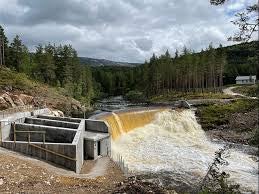The European Marine Energy Centre (EMEC) in Orkney, Scotland, hosted members of the House of Commons Scottish Affairs Committee on Monday, with the MPS tasked with gathering further evidence on renewable energy in Scotland in order to make recommendations to UK Government this summer ahead of November’s COP26 UN Climate Conference in Glasgow.
The Committee held an oral evidence session in Kirkwall to discuss marine renewable energy specifically, as well as wind energy, grid networks and innovation in energy systems.
Five Committee members met with EMEC’s managing director, Neil Kermode, and external relationship manager, Eileen Linklater, on a boat trip to EMEC’s tidal test site to hear about marine energy’s existing industry and potential in Scotland and the UK.
Committee members were able to see two tidal energy devices on site: Orbital’s O2 device, which was developed with around 80% UK supply chain content; and Magallanes’ ATIR device, a Spanish company bringing inward investment via technology demonstration at EMEC’s world leading facilities.
Members were also introduced to Orkney’s hydrogen infrastructure, showing how marine renewable energy can contribute to the generation of green hydrogen for energy storage, transport and use in Orkney’s burgeoning hydrogen economy.
Committee members had the chance to discuss marine energy and renewables more generally with representatives from across Orkney’s energy supply chain, including Orkney Islands Council, Mocean Energy, Community Energy Scotland, Aquatera and Xodus.
The oral evidence session saw representatives from EMEC, Orbital Marine Power, Aquatera and Orkney Islands Council provide evidence to the Committee on how Scotland’s renewable energy potential could be harnessed most effectively. The opportunities for industries such as marine renewables were highlighted as well as the ongoing challenges faced by the industry (e.g. inadequate grid connections and regulation, and lack of suitable market incentives) which are holding Orkney back from taking full advantage of the existing knowledge and industrial base.
“We have tested more than 30 different wave and tidal technologies in Orkney, giving us valuable experience and insight into the existing UK supply chain and importantly, the economic potential for Scotland and the UK. Marine energy’s predictability offers energy system resilience, and quality job generation provides valuable economic opportunities for maritime communities. Internationally, there’s huge UK export potential as a global marine industry leader,” commented Neil Kermode, Managing Director, EMEC. “However, to deliver these benefits, the sector urgently needs positive signals from government, and we hope the Committee members can help amplify our message which is calling for dedicated support for wave and tidal energy to be part of the UK’s green economic recovery.”
“We had a fantastic opportunity to view EMEC’s tidal test site this June; the cutting edge work being done in Orkney is truly exceptional, with potential to make significant contributions to the energy systems landscape in the near future,” commented Pete Wishart MP, Chair of the Scottish Affairs Committee. “With international collaborations, and world class scientific research, this project showcases what Scotland and the UK have the ability to contribute to the world’s renewables sector.
“With COP26 just on the horizon, this is a project that the UK delegation can be truly proud of. We are immensely grateful to EMEC for being such wonderful hosts and providing key insights into renewable energy projects in the Orkney Islands. The information we heard will be invaluable for our renewable energy in Scotland inquiry.”







